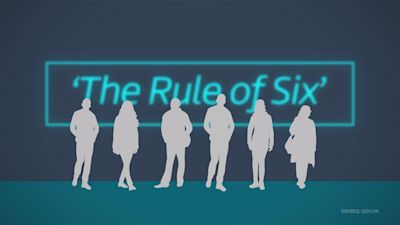What do the ‘rule of six’ coronavirus restrictions mean?

The ‘rule of six’ came into effect in England from Monday, banning gatherings of more than six people due to a surge in Covid-19 cases.
The rule prevents groups of seven or more people from meeting and if you break the restrictions, you could be fined £100.
Here is what you can and can’t do.
What is the ‘rule of six’ in England?
It is now illegal to meet up in a group of more than six people, including children, indoors or outdoors.
You should remain socially distanced from people not in your household when meeting up.
Meeting in a group of seven or more people is against the law and the police have the power to enforce these legal limits and issue fines of £100, up to a maximum of £3,200.
Organisers of gatherings over 30 people can be fined as much as £10,000.
What are the restrictions in Wales?
People in Wales will only be able to meet in groups of six or under indoors and must all belong to the same extended household group.
Up to four households are able to join together to form an extended household.
But, unlike in England, children under 11 will be exempt and will not count towards that total.
Also unlike in England, people will also still be able to meet up in groups of up to 30 outdoors, as long as social distancing is maintained.
However, Rhondda Cynon Taf has become the second county in Wales to be placed into local lockdown, following a “rapid” increase in virus cases.
From 18:00 on Thursday, the following restrictions will come into force for people living in the county:
-
People will not be allowed to enter or leave the Rhondda Cynon Taf Council area without a “reasonable excuse”, such as travel for work or education.
-
People will only be able to meet outdoors for the time being. People will not be able to meet members of their extended household indoors or form an extended household.
-
All licensed premises will have to close at 11pm.
-
Everyone over 11 must wear face coverings in indoor public places – as is now the case throughout Wales.
What are the rules in Scotland?
In Scotland, only six people from two households can gather and just like England this applies both indoors and outdoors.
But children under 12 won’t count towards the limit of six people.
What about Northern Ireland?
Six people of any age can gather indoors, but they must be from no more than two households and outside, no more than 15 people should meet.

Does the rule apply in areas where there are local lockdown restrictions?
No, in certain areas such as Birmingham, Bolton and Caerphilly county, you are banned from meeting anyone you don’t live with indoors and in some areas, you are unable to meet another household in indoor public venues, such as pubs and restaurants.
What are the exemptions?
If you live with more than six people or have formed a ‘support bubble’ with more than six people, you can still gather together indoors and outdoors.
A support bubble is where one single-adult household has joined up exclusively with another household.
There are exemptions to the rule of six for work, childcare, weddings, funerals, places of worship and organised sport or exercise classes.
You can go to work and school and send your child to a playgroup and attend organised sport, exercises classes and licensed outdoor physical activity.
What sport is allowed?
Grouse shooting, sailing, netball and hockey are on a list of sports that are exempt from the ‘rule of six.’
However a kickabout or rounders in the park are not allowed under the new rules, as this is not organised sport.
The guidance states: “When participating in organised sport or licensed physical activity, you must not gather in groups of more than six before and after the activity.
“You must also ensure you socially distance from people you do not live with (or have formed a support bubble with) wherever possible.
“When playing sports informally with people you don’t live with, you must limit the size of your group to six. It is illegal to do so in a larger group and you may be fined.”
Can I stay overnight at a friend’s house?
Yes, you can stay overnight in someone else’s home, but only if you do not form a gathering of more than six people.
Can I still go to pubs, restaurants and cafes?
You can still visit hospitality venues, but no one should visit in a group of greater than six (unless you are all from the same household or support bubble).
You should avoid ‘mingling’ with anyone outside the group you are with, even if you see other people you know.
Can I look after my grandchildren?
Yes. People in groups of up to six can meet indoors or outdoors, which enables you to spend time with your grandchildren, but whole families may not be able to meet up at once if the group is larger than six.
You should try to maintain a social distance from people you do not live with wherever possible, but this may not always be practicable, so you should still limit close contact as much as possible, and take other precautions such as washing hands and clothes regularly.
If you have formed a support bubble with your grandchildren’s household, which is allowed if either you or they live in a ‘single adult household’, then there can be close contact and social distancing is not necessary.
Are more people allowed at weddings and funerals?
Yes, the ‘rule of six’ does not apply to wedding and funerals – up to 30 people can attend these events.
At weddings and funerals you should still socially distance from people you do not live with.
Places of worship, such as churches, mosques and synagogues, can stay open but worshippers must stay at least one metre apart.
Up to 30 people can also attend ‘other religious and belief-based life cycle ceremonies’ but only ceremonies and not celebrations.
Can I go back to university?
Yes, as the six person limit does not apply to gatherings for educational purposes.
Can I go to a support group?
You can still attend support groups which are designed “to provide mutual aid, therapy or any other form of support.”
This includes:
-
Support to victims of crime
-
Recovering addicts
-
New parents
-
People with long-term illnesses
-
Those facing issues relating to their sexuality or gender
-
Those who have suffered bereavement